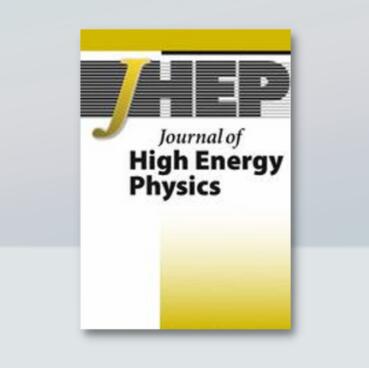从矢量介子主导性看({K}^{pm}\to {\pi}^{pm}\nu \overline\{nu}\) 中的轻夸克环和 Kaon Unitarity Triangle 的更新
IF 5.4
1区 物理与天体物理
Q1 Physics and Astronomy
引用次数: 0
摘要
我们利用矢量介子主导性来计算稀有衰变({K}^{\pm}\to {\pi}^{\pm}\nu \overline\{nu} \)分支率的非微扰贡献,这些贡献源自涉及上夸克环的矩阵元素。然后,在仅基于 Kaon 部门观测指标的 Unitarity Triangle sqtudy 背景下讨论了这一观测指标以及 K0 → π0l+l- 和直接 CP 违反参数 ({\epsilon}_K^{\prime } \)的重要性。本文章由计算机程序翻译,如有差异,请以英文原文为准。
Light quark loops in \( {K}^{\pm}\to {\pi}^{\pm}\nu \overline{\nu} \) from vector meson dominance and update on the Kaon Unitarity Triangle
We use vector meson dominance to calculate non-perturbative contributions to the branching ratio of the rare decay \( {K}^{\pm}\to {\pi}^{\pm}\nu \overline{\nu} \) stemming from matrix elements involving up-quark loops. The importance of this observable as well as of K0 → π0l+l− and of the direct CP violation parameter \( {\epsilon}_K^{\prime } \) is then discussed in the context of a Unitarity Triangle sqtudy based on Kaon sector observables only.
求助全文
通过发布文献求助,成功后即可免费获取论文全文。
去求助
来源期刊

Journal of High Energy Physics
物理-物理:粒子与场物理
CiteScore
10.30
自引率
46.30%
发文量
2107
审稿时长
1.5 months
期刊介绍:
The aim of the Journal of High Energy Physics (JHEP) is to ensure fast and efficient online publication tools to the scientific community, while keeping that community in charge of every aspect of the peer-review and publication process in order to ensure the highest quality standards in the journal.
Consequently, the Advisory and Editorial Boards, composed of distinguished, active scientists in the field, jointly establish with the Scientific Director the journal''s scientific policy and ensure the scientific quality of accepted articles.
JHEP presently encompasses the following areas of theoretical and experimental physics:
Collider Physics
Underground and Large Array Physics
Quantum Field Theory
Gauge Field Theories
Symmetries
String and Brane Theory
General Relativity and Gravitation
Supersymmetry
Mathematical Methods of Physics
Mostly Solvable Models
Astroparticles
Statistical Field Theories
Mostly Weak Interactions
Mostly Strong Interactions
Quantum Field Theory (phenomenology)
Strings and Branes
Phenomenological Aspects of Supersymmetry
Mostly Strong Interactions (phenomenology).
 求助内容:
求助内容: 应助结果提醒方式:
应助结果提醒方式:


